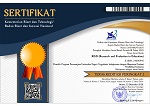An evaluation of the implementation of study-from-home policy in senior high school during Covid-19 pandemic
DOI:
https://doi.org/10.21831/reid.v8i1.36734Keywords:
Covid-19 pandemic, study from home, evaluationAbstract
The increase in Coronavirus Disease-19 in Indonesia has prompted the central and regional governments to issue a study-from-home (SFH) policy through the Minister of Education and Culture Circular Letter Number 4 of 2020. The policy aims to reduce activities in schools but uses a meaningful curriculum. The purpose of the evaluation is to see the SFH policy implementation related to teaching and learning activities. The collection of information and data, interviews, and group discussion forums were conducted through online meetings, including video conferencing and other social media. This policy implementation was analyzed in the aspects of context, input, process, and product. The study involved 2,862 respondents, consisting of 60 people from the Education Office, 284 school principals, 861 teachers, 677 students' parents, and 980 students. Evaluation results for each aspect show that: (1) in terms of context, policymakers in the regions have followed up Governor's decrees and the SFH program (78.33%); (2) in terms of input, schools have prepared 17% of infrastructure and the level of teacher ability is 41.64%; (3) in terms of process, 49.56% of learning is carried out online; and (4) in terms of product, 88% teachers have assessed learning outcomes. Thus, the SFH policy has been carried out optimally, but some learning factors are not going well due to limited cell phones, low teacher competence in using applications, and unavailability of the Internet network in some schools. The SFH implementation at the provincial government level has been carried out effectively and efficiently, but in schools, online learning is still found to be uneven.
References
Center for Policy Research of the Ministry of Education and Culture. (2020). Survei belajar dari rumah tahun ajaran 2020/2021. Center for Policy Research of the Ministry of Education and Culture.
Cross, S., Sharples, M., Healing, G., & Ellis, J. (2019). Distance learners' use of handheld technologies. The International Review of Research in Open and Distributed Learning, 20(2), 223–241. https://doi.org/10.19173/irrodl.v20i2.4040
Directorate Generale of Teacher and Education Personnel of the Ministry of Education and Culture. (2020). Panduan pembelajaran jarak jauh bagi guru selama sekolah tutup dan pandemi COVID-19 dengan semangat merdeka belajar: Manual. Direktorat Jenderal Guru dan Tenaga Kependidikan Kementerian Pendidikan dan Kebudayaan.
Directorate of High Schools. (2020). Buku saku merdeka belajar: Prinsip dan implementasi pada jenjang pendidikan SMA. Direktorat Sekolah Menengah Atas.
Dunn, W. N. (2003). Analisa kebijakan publik (M. Darwin (trans.)). Gajah Mada University Press.
Hardi, A. T. (2020). Dana bos boleh digunakan untuk membeli pulsa. Media Indonesia. https://mediaindonesia.com/nusantara/336944/dana-bos-boleh-digunakan-untuk-membeli-pulsa
Hasbi, M., & Rahmawati, E. T. (2020). Belajar Matematika yang menyenangkan dengan anak di rumah. Direktorat Jenderal Pendidikan Anak Usia Dini, Pendidikan Dasar, dan Menengah.
Indiahono, D. (2009). Kebijakan publik berbasis Dynamic Policy Analysis. Gava Media.
Jacobs, G. M., & Ivone, F. M. (2020). Infusing cooperative learning in distance education. The Electronic Journal for English as a Second Language, 24(1), 1–15. https://www.tesl-ej.org/pdf/ej93/a1.pdf
Jalal, F. (2001). Refeormasi pendidikan dalam konteks otonomi daerah (D. Supriadi (ed.)). Adi Cita.
Kun, K., & Lapp, D. (2020). No longer distant: Distance learning is forever emblazed as our teaching reality. Literacy Today, 38(1), 8–10.
Mashile, E. O., Fynn, A., & Matoane, M. (2020). Institutional barriers to learning in the South African open distance learning context. South African Journal of Higher Education, 34(2), 129"’145. https://doi.org/10.20853/34-2-3662
Minister of Education and Culture Circular Letter Number 4 of 2020 concerning the Implementation of Education Policies in the Emergency Period for the Spread of Coronavirus Disease (covid-19), (2020).
Ministry of Education and Culture. (2020). Penyesuaian keputusan bersama empat menteri tentang panduan pembelajaran di masa pandemi COVID-19. Kementerian Pendidikan Dan Kebudayaan. https://www.kemdikbud.go.id/main/blog/2020/08/penyesuaian-keputusan-bersama-empat-menteri-tentang-panduan-pembelajaran-di-masa-pandemi-covid19
Munir, M. (2007). Pembelajaran jarak jauh berbasis Teknologi Informasi dan Komunikasi. Alfabeta.
Raharjo, S. B. (2014). Kontribusi delapan standar nasional pendidikan terhadap pencapaian prestasi belajar. Jurnal Pendidikan Dan Kebudayaan, 20(4), 470–482. https://doi.org/10.24832/jpnk.v20i4.160
Regulation of the Minister of Education and Culture No 8 of 2020 concerning the Technical Guidelines of Regular School Operational Assistance, (2020).
Stufflebeam, D. L. (1985). Systematic evaluation. Kluwer Nijhoff.
Tachjan, T. (2006). Implementasi kebijakan publik. AIPI Bandung - Puslit KP2W Lemlit Unpad. https://pustaka.unpad.ac.id/wp-content/uploads/2011/02/implementasi_kebijakan_publik_t.pdf
Team Study from Home of the Ministry of Education and Culture. (2021). Evaluasi tayangan program SFH Kemendikbud di TVRI periode Januari-Februari 2021. Team Study from Home of the Ministry of Education and Culture.
Warsita, B. (2013). Perkembangan definisi dan kawasan teknologi pembelajaran serta perannya dalam pemecahan masalah pembelajaran. Kwangsan: Jurnal Teknologi Pendidikan, 1(2), 72–94. https://doi.org/10.31800/jtp.kw.v1n2.p72--94
Downloads
Published
How to Cite
Issue
Section
Citation Check
License
The authors submitting a manuscript to this journal agree that, if accepted for publication, copyright publishing of the submission shall be assigned to REID (Research and Evaluation in Education). However, even though the journal asks for a copyright transfer, the authors retain (or are granted back) significant scholarly rights.
The copyright transfer agreement form can be downloaded here: [REID Copyright Transfer Agreement Form]
The copyright form should be signed originally and sent to the Editorial Office through email to reid.ppsuny@uny.ac.id

REID (Research and Evaluation in Education) by http://journal.uny.ac.id/index.php/reid is licensed under a Creative Commons Attribution-ShareAlike 4.0 International License.







.png)





